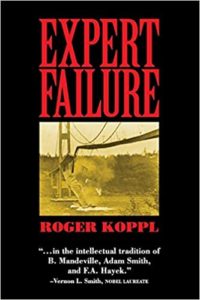The Tail Wags the Dog

In his 2018 book Expert Failure, Roger Koppl discusses the influence of “big players” on expert opinion (pages 214-215, 230). A “Big Player” is an entity whose presence alone can influence individual behavior. Where Roger gives the example of the IPCC and the intelligence system in the US, it seems we’re also seeing it now in policy. Both major Presidential candidates were major “buyers” of expert opinion and it seems their mere presence is enough to influence the market for expert opinion. Both floated incredibly heterodox economic policies (for Trump: protectionism; for Harris: price controls). And, despite the overwhelming majority of professionals being against said policies, both have found experts willing to lend credibility to their policies.

This leads me to consider a significant problem with “science-guided policy.” While science can be used to influence policy outcomes in a potentially helpful way (eg, a carbon tax can be used to reduce CO2 emissions and fight global warming), the tail can come to wag the dog, too. Policies can be asserted and scientific justifications sought after the fact. Consequently, this can lead to a game of “whack-a-mole” where a rotating list of (often contradictory) justifications are floated and discarded as situations warrant. In turn, actual policy discussions go nowhere because goal posts are constantly shifting. In short, expert opinion becomes about justifying a preferred policy rather than policy attempting to solve a given problem and seeing expert opinion to help.
We saw this with the Harris campaign when she floated the idea of a federal price-gouging ban on groceries. The policy is non-specific, and we saw few economists come out to justify her claims: price controls in an emergency doesn’t have negative welfare effects, price controls in a monopoly can be welfare enhancing, price controls in a government owned monopoly can be welfare enhancing, price controls in an inflationary environment can be good, etc. All of these justifications require sometimes mutually exclusive assumptions about the market conditions. They cannot all be correct. The policy is in search of justification, and the “big player” is able to offer enough to influence the expert opinion.
Indeed, in an extreme case, the influence can be enough to influence experts to recant previous arguments! University of Michigan economist Justin Wolfers is one such example. In Wolfers’ Principles of Microeconomics textbook with Betsey Stevenson, Wolfers and Stevenson discuss anti-price gouging legislation as a form of price controls and the economic consequences thereof (see page 146, 2nd edition). However, in an August 28 interview with CNBC, Wolfers denied that anti-price gouging legislation was a form of price control.
We saw the same with the Trump campaign: justifications for tariffs have ranged from national security, to protect jobs, to fair trade, to trade deficit reduction, to optimal tariff, to revenue maximization, to externality, etc.
When the tail wags the dog (when the policy drives justification), policy discussions become difficult; since there is no justification, no problem, stated, it is malleable and so defenders of the policy just move from one to the other. The scientific expertise of the justifiers gives credibility to these schemes.
Jon Murphy is an assistant professor of economics at Nicholls State University.
